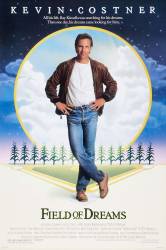Continuity mistake: Near the beginning, as Ray has a vision of the baseball field, look at the difference of the angle of the sun. During the beginning of this sequence it's near noon. When Ray sees the field materialize the sun is obviously further west in the sky. Then, at the end of the sequence it is noon again.
Continuity mistake: The sun changes considerably when Doc is leaving to walk into the corn and the previous and following shots. When it cuts to Shoeless Joe, the sun is at his back. Back to Doc leaving, the sun is setting.
Continuity mistake: The clock at Fenway jumps two minutes in very little time from 10:30 to 10:32 in the space of two short scenes.
Continuity mistake: During the first practice, the sun changes from late afternoon initially to midday and back to late afternoon throughout the sequence.
Factual error: The catcher appears with the other players when they come out of the corn. The catcher was never included in the scandal, nor was a catcher banned.






Answer: If they go past that line they will no longer be able to play again. The field is their only place to exist in the afterlife (their heaven if you will). That line is the end of the field and they will not be able to return if they cross it.
Scrappy
So do the players not go after foul ball fly balls/pop ups along the first base side?